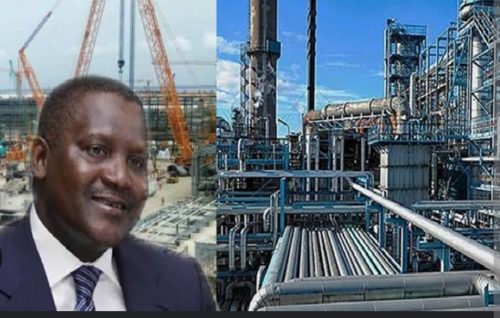Dangote Refinery and the spate of unending host community hostilities: an unintended loss?
It is no longer news that the Dangote petroleum refinery and petrochemical plant was commissioned on May 22, 2023, by the immediate past President of Nigeria, Muhammadu Buhari. The refinery, which covers an area of approximately 2,635 hectares, is expected to be Africa’s largest oil refinery and the world’s largest single-train facility.
It is also a fact that the refinery pipeline infrastructure is the largest in the world, with 1,100 kilometers built to handle 3 billion standard cubic feet of gas per day. The refinery alone has a 435 MW power plant and is estimated to meet 100% of the Nigerian requirement for all refined products and have a surplus of each of these products for export.
Over the years, the Nigerian oil and gas industry has been plagued with significant host community hostilities, crude oil theft, and vandalism of critical oil and gas infrastructure. These issues have negatively impacted production levels and foreign exchange from crude oil sales. To appreciate the extent of these challenges on the country’s revenue profile, the Nigerian upstream petroleum regulatory commission (NUPRC) revealed in July 2022 that about 9 million barrels of oil valued at approximately 2 billion USD were lost to these activities in the first quarter of 2022.

More so, a quick sojourn through memory lane will reveal that in 2020, NNPC FAAC reports showed that disruptions in crude oil production reached 36.3 million barrels, out of which 3.6 million were caused by disgruntled members of host communities over issues ranging from salaries to the environment and appointments. The face-off resulted in the shutdown of terminals for 175 days during the year. Also, the January 2020 analysis of NNPC’s FAAC report indicated production disruption at FORCADOS terminal by community members and workers for 13 days, which cost the country 104,000 barrels of oil valued at $5.2 million (around $2.1 billion). Furthermore, at the UGO OCHA terminal, Jones Creek flow station was shut down for 10 days, resulting in the loss of another 250,000 barrels of oil, which could have fetched Nigeria $12.5 million (#5.1 billion). In May 2020, Forcados terminals were again shut down for seven days by the community, thereby disrupting the production of 336,000 barrels that could have generated $16 million in oil revenue. In September, at OML 30, the large onshore block in the western Niger Delta, Community protests led to the shutdown of the FORCADOS terminal over compensation by Heritage Energy, which resulted in Nigeria losing 280,000 barrels of oil valued at $1.4 million (#5.7 billion). The losses reached their highest level in November, as community members and workers’ protests cost Nigeria 1,073,000 barrels of oil valued at around $53 million (#219 billion).
Presently, statistics reveal that the numbers and figures quoted above have tripled greatly, and there is a massive decline in production volume as well as the attendant reduction in revenue because of these activities by the host communities.
In striking a nexus between the dire statistics above and the present discussion, it is an established principle of business that, in choosing a business location, especially for manufacturing companies, closeness to raw materials remains a vital consideration. One then wonders why Alhaji Aliko Dangote left the oil-rich Niger Delta, where access to crude and gas would have been readily available, for Lagos State, where these components would be trucked all the way to the refinery to be processed, even with the attendant hazards. Whichever mode of conveying crude to the refinery will be employed, it is my honest consideration that if it was cited in the same region where raw materials are, it would have been less expensive.
However, flowing from the facts established above and from the lenses of a professional community relations professional in the oil and gas industry, it is my submission that one of the factors that worked against the establishment of the Dangote refinery in the Niger-Delta region is the unending host community hostilities, thuggery, unlimited community taxes, etc. These hostilities have seen multinationals and other oil companies exit the region. An example is Shell BP, which divested all its onshore concerns for off-shore and deep-water operations.

It is estimated that the Dangote Refinery will provide over 300,000 jobs. With the rate of unemployment in the country and the Niger Delta region in particular, one could only imagine the opportunities that would have been birthed in the region if the refinery was cited there. Apart from the massive creation of jobs, other social benefits would have accrued to the region as well.
From the analysis above, it is clear that the time is ripe for host communities to reflect deeply and change the prevailing approach they have hitherto deployed in relating to oil and gas companies. Violence and hostilities have not yielded any significant results, as the region is still bedeviled with a myriad of issues ranging from poor infrastructure to unemployment. While this author is not excusing oil and gas companies for the incessant gas flaring and other environmental pollution that has plagued the region because of their activities, this author believes that the writing on the wall is clear: dialogue instead of violence would benefit host communities more, especially in the long term. In a world transitioning from fossil fuels, diplomacy and not militancy will lead to host communities reaping more benefits from their natural endowments while time still permits.
Abasiama Umohatah is a community and government relations specialist and presently a PhD candidate in energy law at Nnamdi Azikiwe University, Awka, Nigeria.

































